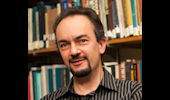The Astrophysical Institute (ApI) presents Ohio University Alumnus and Professor, Markus Böttcher of the North-West University
Potchefstroom, South Africa, presenting “Particle Acceleration and Plasma Turbulence at Shocks in Relativistic Jets” on Wednesday, Jan. 27, at at 4:10 p.m. in Finlay Conference Room Edwards Accelerator Lab.
Abstract: The acceleration of particles (electrons, protons) in the relativistic jets of active galactic nuclei, especially blazars, is likely related to relativistic shocks propagating through these jets. The efficiency of the diffusive shock acceleration (DSA) process depends critically on the characteristics of magneto- hydrodynamic plasma turbulence caused by the shock, which allows particles to reverse their gyro motion along field lines (via pitch angle scattering) in order to bounce back and forth across the shock (first-order Fermi acceleration). The most critical parameter is the particles’ mean free path for pitch angle scattering and its dependence on particle momentum. In order to diagnose the characteristics of the DSA process, we have coupled Monte-Carlo simulations of diffusive shock acceleration with radiative transfer simulations, using the Monte-Carlo generated particle spectra as inputs. Based on fits to the multiwavelength spectral energy distributions of three blazars (Mrk 501, BL Lacertae, AO 0235+164), we find that the pitch-angle-scattering mean free path of electrons near the shock needs to increase drastically with particle momentum, in order for the DSA process to efficiently accelerate particles out of the thermal pool to non-thermal energies, but at the same time, shut off the acceleration process at moderate energies so as to produce the observed peak of the synchrotron emission spectrum of blazars at optical/UV/X-ray energies. The implications of this result for the characteristics of plasma turbulence at relativistic shocks will be discussed.




















Comments